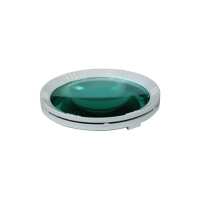
An optional add on or replacement lens for use with MG163043 Series Interchangeable Lens Magnifying Lamp.Achieve multiple magnifications by easily changing out the lenses, without purchasing additional lamps. Simply twisting and lock the lens in place for secure viewing.This 5 Diopter Lens offers 2.25X magnification.The diameter of the lens is 7 inches, designed to fit interchangeable magnifying lamps with a 7 inch diameter opening.Also available in 3 Diopter.The lens is made from genuine diopter glass, providing crystal clear viewing. Unlike other magnifying lamp lenses made with acrylic or plastic, this lens lasts for years of use without yellowing or clouding.Please note that this lens is designed to be used with MG163043 series models, which houses 7 inch diameter lenses.Quick OverviewOptical Lens Diopter: 5 Diopter (2.25X). Lens Size:
Dia. 178mm (7 in. ). Magnifier Lens Material: Green Float Glass. %Bigger Than Object: 125%. MG16304392 5D Magnifying Lamp Lens (7 inch)Magnifying Lamp Parts & AccessoriesSystem Field of View Dia. 5 in. System Working Distance110mm (4.331 in. )Optical Lens Diopter5 Diopter (2.25X)Lens Size Dia. 178mm (7 in. )Magnifier Lens MaterialGreen Float Glass%Bigger Than Object125%Other ParametersMaterialHeavy Duty PlasticColorWhiteNet Weight1.44kg (3.17lbs)Dimensions Dia. 200x30mm (7.874x1.181 in. )
.tb_part
{
width: 100%;
border: solid 0px #ccc;
font-size:12px;
}
.tb_part tr
{
height: 30px;
line-height: 30px;
}
.tb_part td
{
white-space: nowrap;
}
.tb_part_1 td
{
white-space: wrap;
}
.normal{
border-left:solid 2px black;
border-right:solid 2px black;
}
.tb_part tr.normal td
{
border:solid 1px #ccc;
padding-right:5px;
}
.tb_part tr.normal:nth-child(2){
border-top:solid 2px black;
}
.tb_part tr.normal:first-child{
border:none;
}
.tb_part tr.normal:first-child td{
border:none;
font-weight:bold;
font-size:16px;
}
.end-border{
border-bottom:solid 2px black;
}
.tb_part tr.memo,.tb_part tr.memo td{
border:none;
}
Technical InfoInstructionsSystem Field of ViewClose ΛField of View, is also called FOV.
The field of view, or FOV, refers to the size of the object plane (i.e., the plane of the point of the observed object perpendicular to the optical axis), or of its conjugate plane (i.e., object to primary image distance), represented by a line value. System field of view is the size of the actual diameter of the image of the terminal display device of the instrument, such as the size of the image in the eyepiece or in the display.
Field of view number refers to the diameter of the field diaphragm of the objective lens, or the diameter of the image plane formed by the field diaphragm. Field of view number of objective lens = field of view number of eyepiece / (objective magnification / mechanical tube length)
Large field of view makes it easy to observe the full view and more range of the observed object, but the field of view (FOV) is inversely proportional to the magnification and inversely proportional to the resolution, that is, the larger the field of view, the smaller the magnification, and also the lower the resolution of the object to be observed. There are usually two ways to increase the field of view, one is to replace with an objective lens of a smaller multiple, or to replace with an eyepiece of a smaller multiple. System Working DistanceClose ΛWorking distance, also referred to as WD, is usually the vertical distance from the foremost surface end of the objective lens of the microscope to the surface of the observed object. When the working distance or WD is large, the space between the objective lens and the object to be observed is also large, which can facilitate operation and the use of corresponding lighting conditions.
In general, system working distance is the working distance of the objective lens. When some other equipment, such as a light source etc., is used below the objective lens, the working distance (i.e., space) will become smaller.
Working distance or WD is related to the design of the working distance of the objective lens. Generally speaking, the bigger the magnification of the objective lens, the smaller the working distance. Conversely, the smaller the magnification of the objective lens, the greater the working distance. When it is necessary to change the working distance requirement, it can be realized by changing the magnification of the objective lens. PackagingClose ΛAfter unpacking, carefully inspect the various random accessories and parts in the package to avoid omissions. In order to save space and ensure safety of components, some components will be placed outside the inner packaging box, so be careful of their inspection. For special packaging, it is generally after opening the box, all packaging boxes, protective foam, plastic bags should be kept for a period of time. If there is a problem during the return period, you can return or exchange the original. After the return period (usually 10-30 days, according to the manufacturer’s Instruction of Terms of Service), these packaging boxes may be disposed of if there is no problem.
About Boli Optics:
Boli Optics Microscope Supplier sells professional microscopes, microscope accessories, and magnifying lamps. We offer parts and accessories compatible with Leica, Olympus, Nikon, and Zeiss, and more. We supply research laboratories, medical centers, universities, industrial manufactures, factories, and more. Our engineers and technicians provide technical support and design & manufacture custom microscope products for your applications. Our products are manufactured under ISO 9001 quality control standards. We also provide OEM service. Since 1994, our talented team has been working in the optics industry and serving our customers whole-heartedly. Based in Southern California, we offer fast, same day shipping from our local warehouses.
Visit Product PageEmail:
sales@bolioptics.com
Location:
8762 Lanyard Court,
Rancho Cucamonga
California
91730



